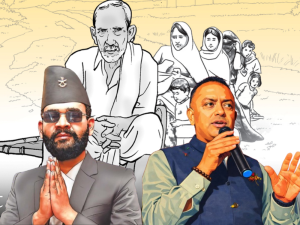Columns
The economy moves on
The impact of the pandemic on the Nepali economy is waning.
Sujeev Shakya
It is very difficult for people who have recently arrived in Nepal to comprehend how the economy functions and how the pandemic has impacted the economy. We find that people analysing the Nepali economy try to put it in the same basket as the Indian or other South Asian economies or economies in Africa of this size. But little analysis is done on the relationship between society, culture and Nepali economy. One needs to visit the clubs in Thamel that are packed to the hilt on weekends and or observe the swarm of people that come to Kathmandu or other urban centres for political rallies. There is surely a lot of domestic tourism spending fueled by rent money, political party treasures and graft.
While most of the countries in the world are reeling under the impact of Covid-19, Nepal has not shown signs of major impact. There is always a vulnerable group of the population, pandemic or not, that the state does little for in terms of welfare. While there are multiple poverty alleviation programs—albeit lesser than a decade ago—this segment continues to be the begging bowl mascot for the government that they want to do little about resolving.
Much of Nepali income is derived out of assets, and the asset values have not been impacted by the pandemic. We see real estate transactions taking place as more graft money comes out of government spending, remittances continue to flow and people continue to take land and a house as an important part of investment. The construction industry continues to flourish as we have always seen during times of political uncertainty, it is easier to get government, guthi and other private land leased for construction, and approvals for constructions come at a fairly good pace. There are no fears of the government taking over land for projects as the government does not have time to do anything beyond keeping the salaries and regular expenditure flowing.
There is a lot of liquidity in the market as bank deposits swell to an amount equalling 104 percent of the GDP. That is Rs4 trillion in cash lying idle in the banks that can be put to productive use in case businesses or the government wants to. The stock market has broken all records in terms of prices; daily transactions around $70 million fueled by bank loans. If lending for stock investment works, why would banks bother to provide funding for small and medium enterprises? Bank profits have not plummeted, which means a segment that comprises the bulk of the stock market keeps its prices up. With trading in stock going digital and digital payments possible, more people are joining the large number of people who want to try their luck in the stock market. In a recent public offering, more than 1.5 million Nepalis or nearly 15% of the eligible population, filled the required form! So, where is the impact on the economy?
The only sectors that have been hit hard are the ones directly linked with foreign tourists: hotels frequented by foreign tourists, trekking guides and people who deal only with foreign tourists. Hotels in the capital that have been dependent on local conferences, training and social functions are bouncing back as Nepalis have not cut down on their social spending. Nepalis have even decided to not stay away from social functions. People are proud of hosting weddings, inviting a thousand guests. As a nation identified globally with the brave Gurkhas who fight and die in other people’s war, fear is a little understood concept.
We also reside in a society that loves to not follow the rules, led by people who take pride in pushing privileges, breaking norms and ensuring survival at the cost of others. This was clearly reflected in the vaccination priority afforded to some sectors over tourism. Since we do not care about how history will be written, we are pretty reckless in our behaviour.
It is always important to understand that Nepal does not export many goods to the outside world and the 37 percent of IT services that comprise exports have been hit least. They have rather done better, as the world moves to digital platforms requiring more back-end services. World trade fluctuations have little impact on the country. Compared to other countries where we see a stark fall in the consumption of goods, Nepal has not seen such a drop. The major source of money in the system is corruption, which has increased during the pandemic as all major reports show. International development assistance continues as they are aware uncertainty is the only constant in Nepali politics. In many places around the world, we hear of people going vegetarian, cutting down food and other consumption. In Nepal, besides the bottom 10 percent (who are in a constant state of poverty) it is rare to hear people giving up meat, packaged food or alcohol—or any other thing they could do without during the pandemic.
If there is no second wave, Nepal will see itself back on track. Indian tourists, who may face restrictions to travel to other parts of the world, will start arriving in April, whether formally or informally. Graft money will keep coming to the market to keep real estate prices stable, and there is enough liquidity in the system that will be consistently fueled by remittances. Nepal is always unique when it comes to the economy!




 13.86°C Kathmandu
13.86°C Kathmandu



.jpg&w=200&height=120)











